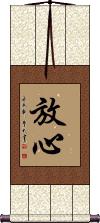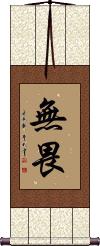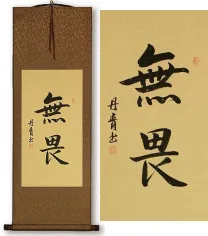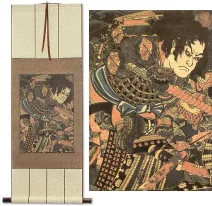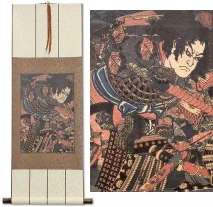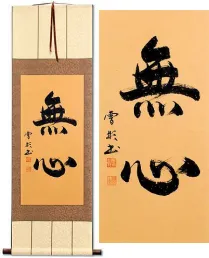Many custom options...
And formats...

No Worries in Chinese / Japanese...
Buy a No Worries calligraphy wall scroll here!
Personalize your custom “No Worries” project by clicking the button next to your favorite “No Worries” title below...
No Worries
My Australian friends always say, “No worries, mate.” It's caught on with me, though I drop the “mate” part since it confuses my fellow Americans.
If you would like to express the idea of “no worries,” 放心 is the best and most natural way to say it in Chinese.
The characters you see to the left can be translated as “put your mind at rest” or “to be at ease.” You could literally translate “no worries,” but it doesn't “flow” like this simple Chinese version.
For your info, the first character means to release, to free, to let go, to relax, or to rest. The second character means your heart or your mind.
Note that in Japanese and Korean, this holds the similar meaning of “peace of mind” but can also mean absentmindedness or carelessness, depending on context.
Preparation Yields No Fear or Worries
有備無患 means “When you are well-prepared, you have nothing to fear.”
Noting that the third character means “no” or “without” and modifies the last... The last character can mean misfortune, troubles, worries, or fears. It could even be stretched to mean sickness. Therefore you can translate this proverb in a few ways. I've also seen it translated as “Preparedness forestalls calamities.”
有備無患 is comparable to the English idiom, “Better safe than sorry,” but does not directly/literally mean this.
No Fear
(2 characters)
無畏 literally means “No Fear.” But perhaps not the most natural Chinese phrase (see our other “No Fear” phrase for a complete thought). However, this two-character version of “No Fear” seems to be a very popular way to translate this into Chinese when we checked Chinese Google.
Note: This also means “No Fear” in Japanese and Korean, but this character pair is not often used in Japan or Korea.
This term appears in various Chinese dictionaries with definitions like “without fear,” intrepidity, fearless, dauntless, and bold.
In the Buddhist context, this is a word derived from the word Abhaya, meaning: Fearless, dauntless, secure, nothing, and nobody to fear. Also, from vīra meaning: courageous, bold.
See Also: Never Give Up | Undaunted | Bravery | Courage | Fear No Man
This in-stock artwork might be what you are looking for, and ships right away...
Gallery Price: $108.00
Your Price: $59.88
Gallery Price: $108.00
Your Price: $59.88
Gallery Price: $79.00
Your Price: $43.88
Gallery Price: $61.00
Your Price: $33.88
Gallery Price: $61.00
Your Price: $33.88
Not the results for no worries that you were looking for?
Below are some entries from our dictionary that may match your no worries search...
| Characters If shown, 2nd row is Simp. Chinese |
Pronunciation Romanization |
Simple Dictionary Definition |
寬暢 宽畅 see styles |
kuān chàng kuan1 chang4 k`uan ch`ang kuan chang |
with no worries; cheerful; spacious |
いいよ see styles |
iiyo / iyo いいよ |
(expression) (colloquialism) don't sweat it; you're welcome; no worries |
多情多恨 see styles |
tajoutakon / tajotakon たじょうたこん |
(n,adj-no,adj-na) (yoji) sensibility; (having) many worries and regrets |
後顧之憂 后顾之忧 see styles |
hòu gù zhī yōu hou4 gu4 zhi1 you1 hou ku chih yu |
fears of trouble in the rear (idiom); family worries (obstructing freedom of action); worries about the future consequences; often in negative expressions, meaning "no worries about anything" |
替古人擔憂 替古人担忧 see styles |
tì gǔ rén dān yōu ti4 gu3 ren2 dan1 you1 t`i ku jen tan yu ti ku jen tan yu |
to fret over the worries of long-departed people (idiom); to worry unnecessarily; crying over spilt milk; often used with negatives, e.g. no need to worry about past issues |
替古人耽憂 替古人耽忧 see styles |
tì gǔ rén dān yōu ti4 gu3 ren2 dan1 you1 t`i ku jen tan yu ti ku jen tan yu |
to fret over the worries of long-departed people (idiom); to worry unnecessarily; crying over spilt milk; often used with negatives, e.g. no need to worry about past issues |
肩で風を切る see styles |
katadekazeokiru かたでかぜをきる |
(exp,v5r) (idiom) to swagger; to strut; to be confident; to have no worries |
備えあれば患なし see styles |
sonaearebaureinashi / sonaearebaurenashi そなえあればうれいなし |
(expression) well prepared means no worries (in time of need) |
備えあれば患いなし see styles |
sonaearebaureinashi / sonaearebaurenashi そなえあればうれいなし |
(expression) well prepared means no worries (in time of need) |
備えあれば憂いなし see styles |
sonaearebaureinashi / sonaearebaurenashi そなえあればうれいなし |
(expression) well prepared means no worries (in time of need) |
備えあればうれいなし see styles |
sonaearebaureinashi / sonaearebaurenashi そなえあればうれいなし |
(expression) well prepared means no worries (in time of need) |
Variations: |
goshinpainaku ごしんぱいなく |
(expression) (polite language) don't worry; no worries; never mind |
The following table may be helpful for those studying Chinese or Japanese...
| Title | Characters | Romaji (Romanized Japanese) | Various forms of Romanized Chinese | |
| No Worries | 放心 | houshin / hoshin | fàng xīn / fang4 xin1 / fang xin / fangxin | fang hsin / fanghsin |
| Preparation Yields No Fear or Worries | 有備無患 有备无患 | yǒu bèi wú huàn you3 bei4 wu2 huan4 you bei wu huan youbeiwuhuan | yu pei wu huan yupeiwuhuan |
|
| No Fear | 無畏 无畏 | mui | wú wèi / wu2 wei4 / wu wei / wuwei | |
| In some entries above you will see that characters have different versions above and below a line. In these cases, the characters above the line are Traditional Chinese, while the ones below are Simplified Chinese. | ||||
Successful Chinese Character and Japanese Kanji calligraphy searches within the last few hours...
